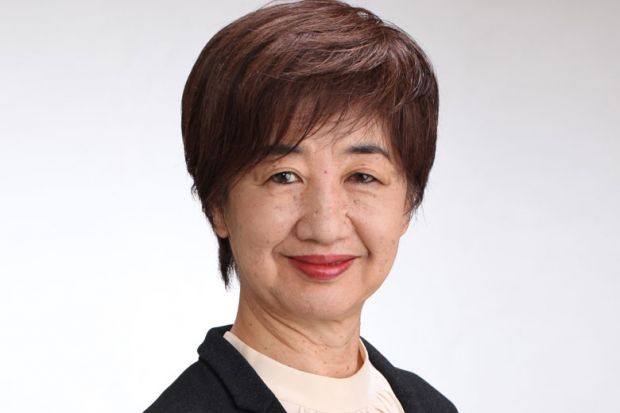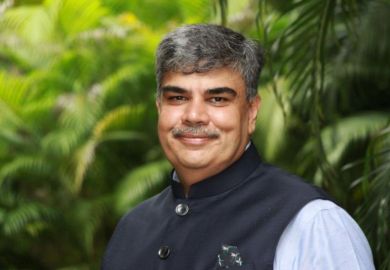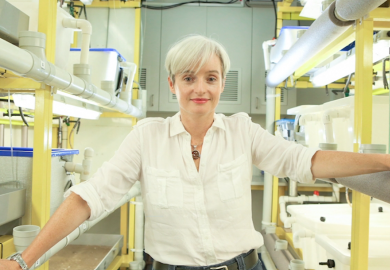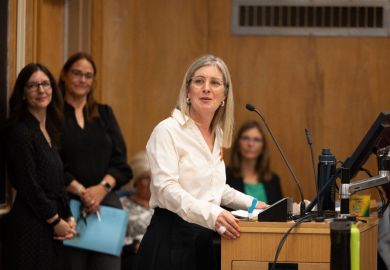Since the bumpy beginning of her tenure as a university president, Kuniko Tanioka hasn’t shied away from controversy. When she put herself forward for the top job at Shigakkan University, she stuck out like a sore thumb. Aged 32, she had little experience of management and had taught for just a few years.
“I was too young to be thought of as a university president…I didn’t have enough background. I did not feel like I was qualified at all to assume the role,” she recalls.
With all the problems then plaguing the small, private institution, which was in the midst of a power struggle, it was difficult figuring out where to begin.
“The university had deteriorated financially and in quality. Because of that, the enrolment was low. We were lacking everything. There were not enough facilities, not enough qualified professors and not enough students,” she says, adding “I was, in a way, lucky…Because we were so desperate, I was probably ahead of the time in terms of thinking and plans.”
Tanioka was well aware of her shortcomings, but she believed she knew her students best and that she could advocate for them effectively. She also felt a responsibility to her family; the university had been funded though a charity set up by her grandfather. Still, she thought the post would be a temporary one.
Now, after 30 years in her position, she has become one of Japan’s longest-serving university presidents. But far from settling down quietly, she has continued to rock the boat.
Taking a risk
In 2010, two decades into her term, when most institutional heads would be forgiven for contemplating retirement, she took a controversial decision that would reshape her institution. Tanioka grew convinced that to keep up with the times and increase enrolment, Shigakkan needed a dramatic restructuring.
“There was a climate of ‘well, let’s try – we don’t understand what you’re talking about but let’s try’,” she says.
Despite reluctance from many academics and Shigakkan’s “very conservative” alumni to change enrolment, Tanioka managed to garner the necessary support. That year, the university opened its doors to male students, becoming co-educational for the first time since it was established as a girls’ sewing school in 1905.
Yet, despite her success in bringing in reforms at her own institution, Tanioka admits she still struggles to get through to some of her colleagues in the sector.
Being an outsider
As a woman in leadership and the head of a small, regional university, it is often an uphill battle to promote its agenda. Even after all this time in academia, Tanioka still sometimes gets the sense she is an outsider.
She feels she’s been passed over as a contender for the executive group that shapes policy for the Association of Private Universities of Japan.
“I’ve had the longest tenure as president of my university, am probably third [longest serving] among those still living, but I was not given much of a chance,” she says.
“Most people at the podium are over 80, old men. Or if it’s a woman, she’s an ex-bureaucrat from the Ministry of Education. It’s still an old boy’s club, totally outdated. Over the years I have proposed, ‘maybe you get more positions for women, committee members, executive members’…but it hasn’t changed much for the last 20 years.”
Tanioka believes that too many of Japan’s private institutions are too focused on profit and not enough on developing their students.
“They’re always talking about financials, lobbying the ruling party…but during Covid, students were ones who lost the most. Over and over, I said we need to focus more on the students.”
Changing culture
But she is optimistic that, even as Japanese academia remains stubbornly behind the times in some areas, things are slowly changing. For female scholars and administrators, things are looking up, with men in power finally confronting gender imbalance in the sector. She credits the national preoccupation with Japan’s standing in the world with forcing men to pay attention.
“Before they just ignored it, but now they’re starting to feel they have to start elevating women’s position more…international pressure is getting stronger [and] the voice from us in the country is stronger,” she says.
While society still pursues the ideal of “a demure girl with a smile”, more young women are learning to speak up for themselves, she believes.
But even as the playing field has become more equal, a worrying new phenomenon has emerged. Tanioka has observed that, among young men and women alike, students often prefer to keep their horizons limited, focusing on “small personal happiness” in favour of engaging with difficult societal questions.
“It’s a younger generation problem. They don’t want to stick out, don’t want to take too much responsibility and assume a leadership position...don’t want to think about difficult things.”
“Japanese students have a good memory are very good at solving math problems – but as a person they are very immature. We have to educate them [providing] more of liberal arts and fundamental intelligence.”
She believes a university education must step in to fill the gaps. Tanioka encourages students to come and talk to her. She believes that if a student and a faculty member need to meet with her, the student appointment “has to go first”.
On any given day, several students usually turn up to chat. Conversations vary from the academic to the personal. Recently, a student asked her for relationship advice.
“She said, ‘I broke up with my boyfriend two months ago but he’s still sending me messages, I also sometimes feel lonely. Should I go back to him?’”
Tanioka appreciates that her young charges may not yet be fully formed adults and she recognises that the first thing on their mind is not always academia – something she believes is important to acknowledge.
“Young people have the highest libido. They fall in love and that’s very important to them. It’s stupid to say ‘study and don’t look at other things’. I want to be close to them, someone to consult about things that you can’t even talk to your own parents about.”
In many ways, 30 years into the job, her priorities remain the same: She seeks to be an advocate for her students. Having also dabbled in politics (she was a representative in the house of counsellors in Japan’s national legislature), she likens the situation to governing.
“If you call this the municipal office, they’re the voters…so whatever job you’re doing, the students come first.”
Register to continue
Why register?
- Registration is free and only takes a moment
- Once registered, you can read 3 articles a month
- Sign up for our newsletter
Subscribe
Or subscribe for unlimited access to:
- Unlimited access to news, views, insights & reviews
- Digital editions
- Digital access to THE’s university and college rankings analysis
Already registered or a current subscriber?








